How many nights have you spent tossing and turning, wishing for a peaceful slumber? Many people struggle with insomnia and anxiety, feeling drained and overwhelmed. They’re desperate for a solution. What if the answer lies in the foods we eat?
Studies show that one-third of adults in the U.S. don’t get enough sleep. This lack of sleep affects daily life and raises anxiety levels12. Changing your diet could transform your nights. You’ll learn how certain foods can help you sleep better and feel more relaxed.
From magnesium to melatonin-rich foods, your diet can help you relax and sleep better. Let’s look at how you can add these natural sleep aids to your meals. This way, your body and mind get the nourishment they need.
Key Takeaways
- One in three adults struggle with sleep issues, emphasizing the importance of addressing insomnia.
- Dietary choices can significantly impact sleep quality and overall well-being.
- Incorporating magnesium-rich foods can enhance relaxation and sleep.
- Foods high in tryptophan can aid in producing sleep hormones like serotonin and melatonin.
- Healthy eating habits can serve as effective natural remedies for sleep-related disorders.
Understanding the Connection Between Food and Sleep
The connection between food and sleep is often ignored in sleep health talks. About one-third of U.S. adults don’t get enough sleep. Many don’t know that what they eat affects their sleep3.
Diets low in fiber and high in saturated fat lead to less restful sleep. Not getting enough fat, carbs, or protein also means poorer sleep quality34. Drinking caffeine or alcohol close to bedtime also hurts sleep quality a lot3.
Poor nutrition can make insomnia worse and might make sleep apnea symptoms worse too. This shows we need to know more about the nutrients for sleep34.
Eating foods rich in B vitamins, like fish and legumes, helps with melatonin. This is key for good sleep4. But, eating too much sugar and carbs can mess with sleep patterns. It affects both REM and slow-wave sleep, making it harder to sleep well54.
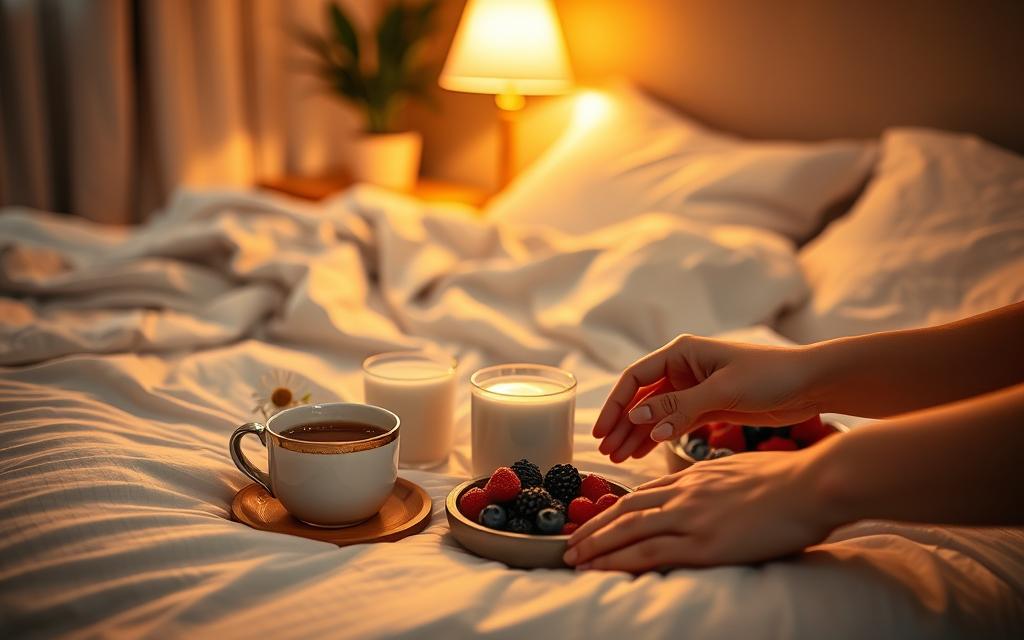
Why Diet Matters for Insomnia and Anxiety
Eating well is key for both body and mind, helping to manage stress and anxiety that can cause insomnia. Studies show that what we eat affects our mood and sleep. For example, insomnia affects 30 to 35 percent of adults, leading to heart problems, depression, and anxiety6.
Foods like whole grains boost serotonin, helping us relax and sleep better7. Eating protein for breakfast keeps blood sugar stable, giving us energy and reducing anxiety7. Not drinking enough water can also make us feel anxious7.
Drinking alcohol might seem to calm us down, but it actually increases anxiety as it breaks down7. Some foods can make us feel anxious or irritable, showing how diet affects insomnia7. Eating a balanced diet with fruits, veggies, and omega-3s is essential for better health and less anxiety7.
Making dietary changes takes time to help with anxiety, making slow changes important7. Managing what we eat is crucial, as it deeply affects our mood and sleep quality.
Food for Insomnia: Key Nutrients to Consider
Understanding the role of specific nutrients can significantly enhance nutrition for sleep. Key nutrients for insomnia include serotonin, magnesium, and tryptophan. These nutrients can influence sleep quality and duration.
Serotonin and Melatonin: The Sleep Hormones
Serotonin levels can impact mood and sleep cycles. Foods rich in carbohydrates can help produce serotonin. This hormone promotes feelings of well-being and relaxation. Higher serotonin levels are linked to better sleep quality8.
Melatonin, known as the sleep hormone, tells the body it’s time to sleep. Foods like tart cherries boost melatonin levels. This can help establish better sleep patterns8.
Magnesium: The Relaxation Mineral
Magnesium is key for calming the nervous system. It helps with muscle relaxation and stress reduction. These are crucial for a restful night’s sleep. Foods like spinach, nuts, and seeds are rich in magnesium and improve sleep quality8.
Lack of magnesium can make it hard to fall or stay asleep. This shows its importance in nutrition for sleep.
Tryptophan: The Sleep-Inducing Amino Acid
Tryptophan is an amino acid found in foods like turkey and low-fat cheese. It helps produce serotonin, enhancing sleep quality. Diets rich in tryptophan promote relaxation and better sleep patterns8.
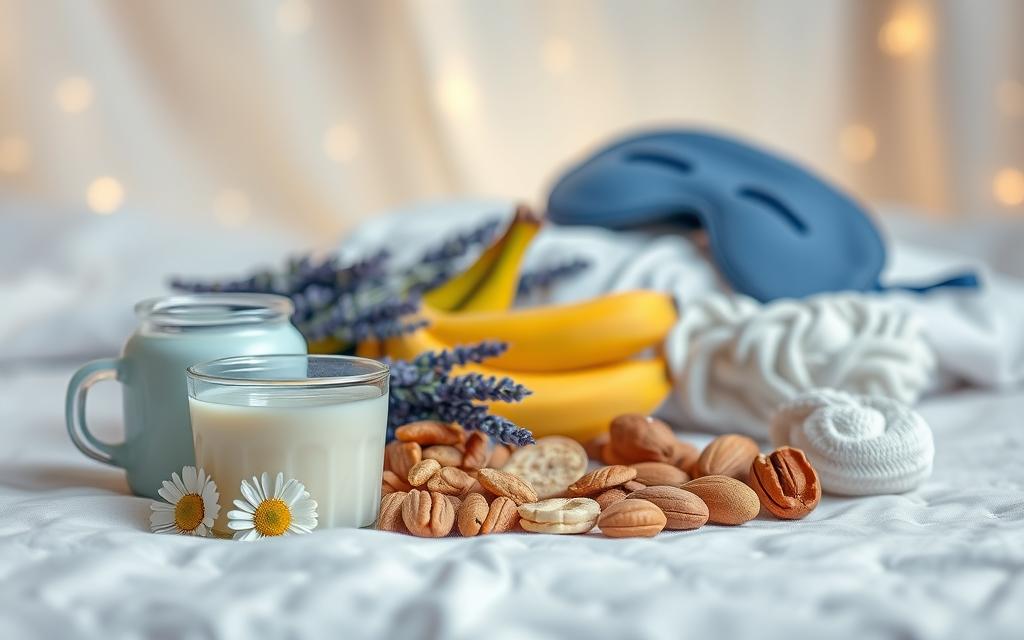
Best Foods for Insomnia
Adding certain foods to your diet can help with insomnia. Research shows some foods improve sleep quality. These foods help you fall asleep faster and sleep better.
Kiwi: A Sleep-Inducing Fruit
Kiwi is known for helping you sleep. Studies say eating two kiwis before bed improves sleep. Adding kiwi to your evening routine is a simple way to fight insomnia.
Fatty Fish: Omega-3 Rich Choices
Fatty fish like salmon are great for sleep. They have omega-3s and vitamin D, which help with serotonin. Eating fatty fish regularly can make your sleep better.
Nuts: A Natural Snack for Better Sleep
Nuts, like walnuts and almonds, are good for relaxation. They have melatonin and magnesium for better sleep. Eating nuts before bed is a tasty way to fight insomnia.
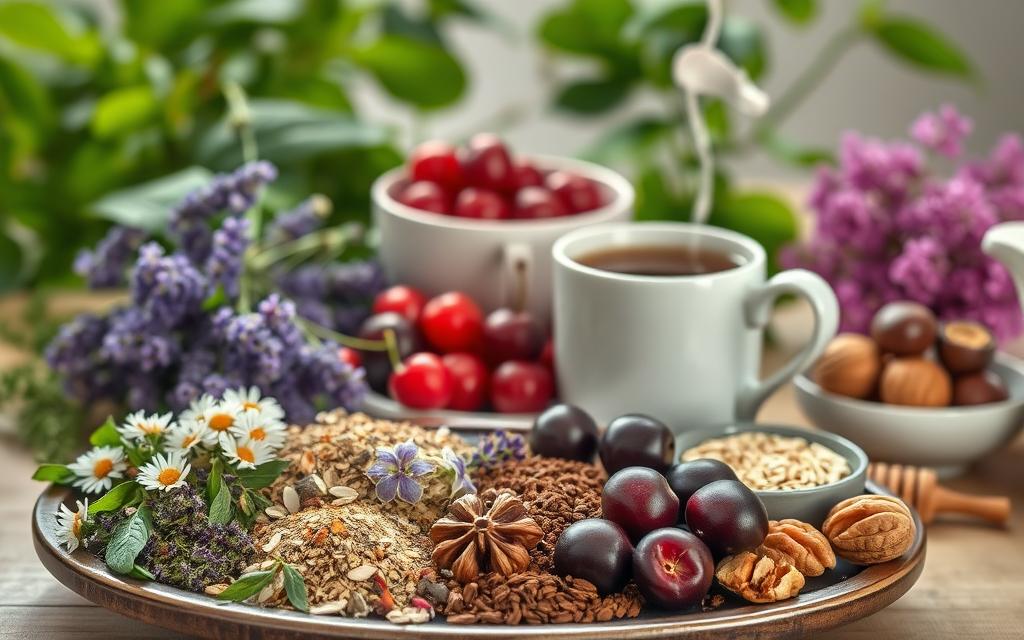
Sleep-Inducing Foods to Add to Your Diet
Adding sleep-inducing foods to your meals can improve your sleep quality. Research shows many foods that help you sleep better. They also boost your overall health.
Tart Cherries: A Natural Source of Melatonin
Tart cherries are full of melatonin, a hormone that helps control sleep. Drinking two cups of tart cherry juice a day can help you sleep longer and better. This is good news for those with insomnia9.
They are a natural way to increase melatonin levels. This makes them a great choice for your bedtime routine.
Malted Milk: Calming Bedtime Beverage
Malted milk is a calming drink to have before bed. Studies suggest it can reduce sleep breaks. This helps you sleep more soundly9.
The carbs and vitamins in malted milk relax you. This makes it a good choice for a restful night’s sleep.
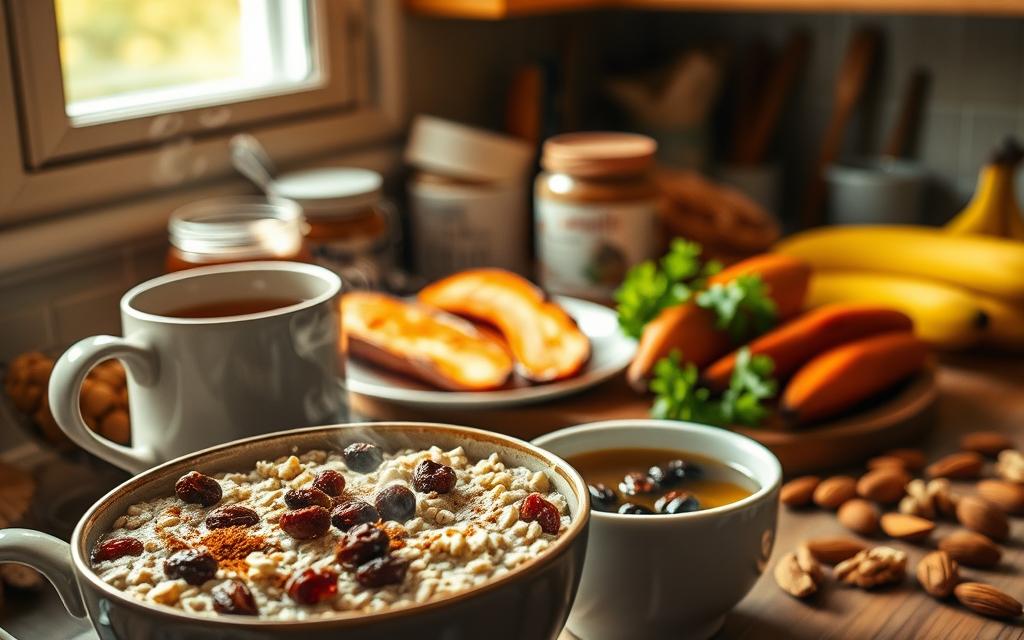
Foods to Avoid for Better Sleep
Knowing how certain foods affect sleep is key for a good night’s rest. Some foods can really mess with your sleep, making it hard to fall and stay asleep.
Caffeine: The Sleep Disruptor
Caffeine is in coffee and tea and stays in your system for hours. It keeps you awake because it’s so stimulating. As you get older, you might feel caffeine’s effects more, which is why it’s best to have it in the morning or early afternoon10.
Drinking caffeine too close to bedtime can make it hard to fall asleep. It might even keep you awake all night.
High-Sugar Foods: Energy Boosts at Night
High-sugar foods give you energy, but then crash it. This can wake you up in the middle of the night and ruin your sleep. It’s important to skip sugary snacks before bed1110.
High sugar levels can also make you uncomfortable. This makes it even harder to sleep well.
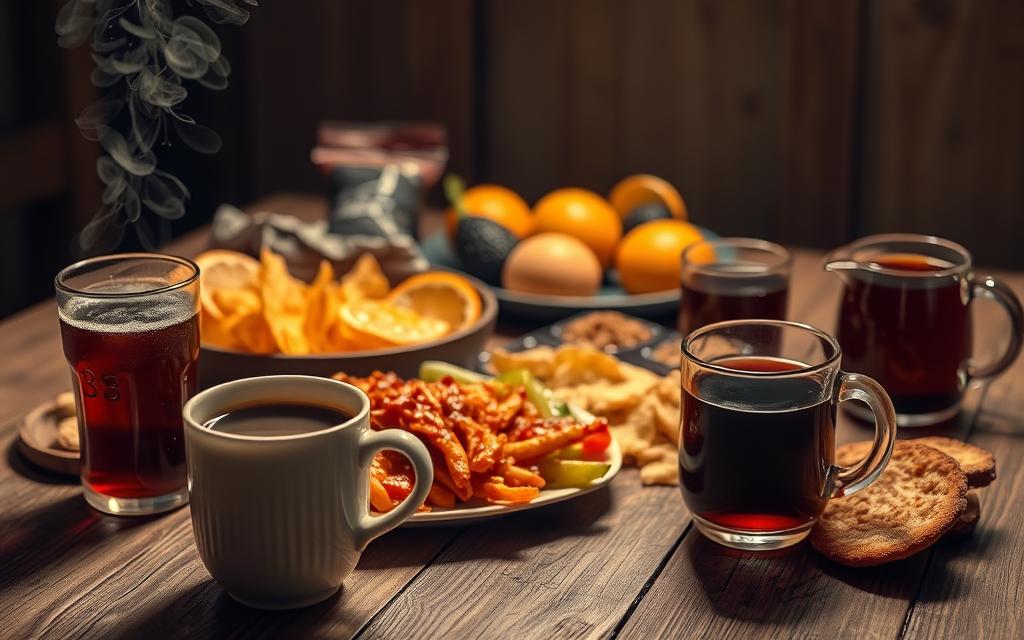
Bedtime Snacks for Insomnia Relief
Adding soothing foods to your evening can boost sleep quality. The right snacks can relax you and get your body ready for sleep. Here are two great options for a restful night.
Low-Fat Yogurt with Fruits
Low-fat yogurt is packed with protein and calcium, key for better sleep. A 100-gram serving has 121 milligrams of calcium, helping you fall asleep faster12. Adding fruits like bananas boosts its benefits. A banana has lots of magnesium, which relaxes muscles12.
These snacks not only taste good but also help your body sleep better.
Whole Grain Crackers with Nut Butter
Whole grain crackers with nut butter mix complex carbs with protein. This combo keeps blood sugar stable, preventing sleep breaks. Nuts like almonds or pistachios add melatonin, making it a perfect snack13.
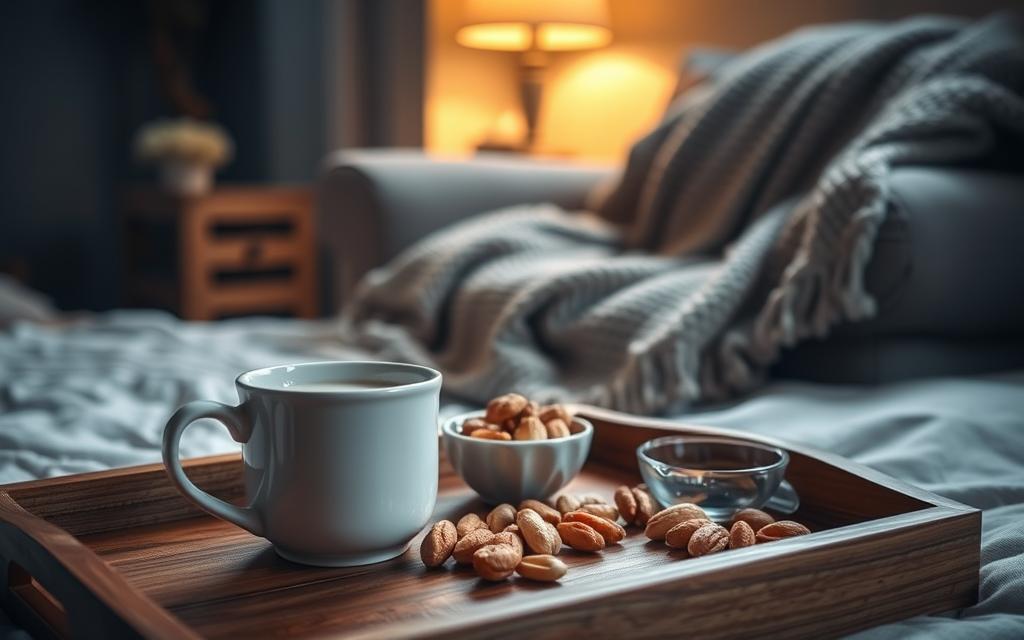
Timing Your Meals for Optimal Sleep
Knowing how meal timing affects sleep is key to a good night’s rest. Studies show that eating at the same times each day improves sleep. About 59 percent of Americans eat at the same times every day. On the other hand, 4 in 10 do not, which can disrupt sleep14. Eating at regular times helps your body’s internal clock stay in sync with natural rhythms.
Eating a light dinner 2-3 hours before bed is best. It helps your body relax and get ready for sleep14. People who eat at the same times each day are 14 percent less stressed14. Lower stress levels can also improve sleep quality, making it crucial to eat well before bed.
The Impact of Meal Timing on Sleep Quality
Adding meals to your daily routine can greatly improve sleep. For instance, eating a big meal late at night can raise blood sugar levels more than eating a regular dinner15. Those who eat large dinners often have trouble digesting, making it hard to fall asleep16. It’s recommended to keep evening meals under 500 calories to avoid sleep disruptions16.
Creating a proper eating window can improve both meal timing and sleep quality. Our bodies use about 60% of energy for basic functions, showing the importance of when and what we eat15. By avoiding caffeine and alcohol before bed and choosing healthier foods, you can greatly improve your sleep and health.
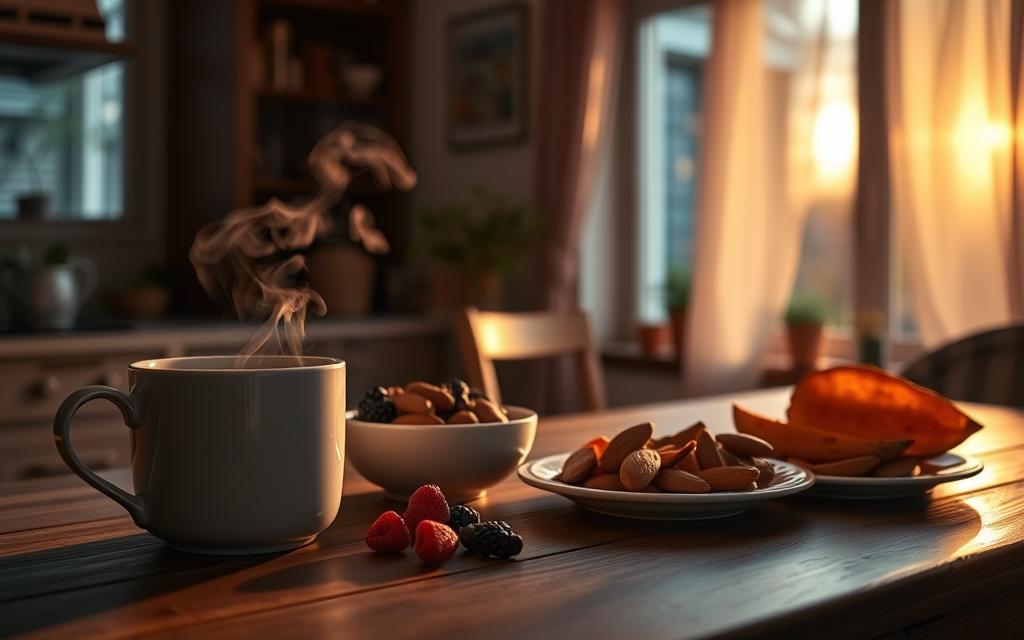
Natural Remedies for Sleep Improvement
Looking into natural remedies can really help you sleep better. Using herbal sleep aids like chamomile and valerian root can work well with what you eat. These herbs are calming, helping you relax and sleep better.
Herbal Teas: Chamomile and Valerian Root
Drinking chamomile tea can make sleep much better, even for older adults with insomnia17. Valerian root is also great for unwinding before bed. Research shows it can help sleep, but results vary17. Drinking these teas often can make your sleep longer and better.
Living a Sleep-Conducive Lifestyle
Living a lifestyle that supports sleep is key. Following good sleep habits, like a regular bedtime routine and less screen time before bed, helps17. Keeping your room cool, between 65 and 72 degrees, is also important for good sleep18. These steps can make natural sleep remedies even more effective.
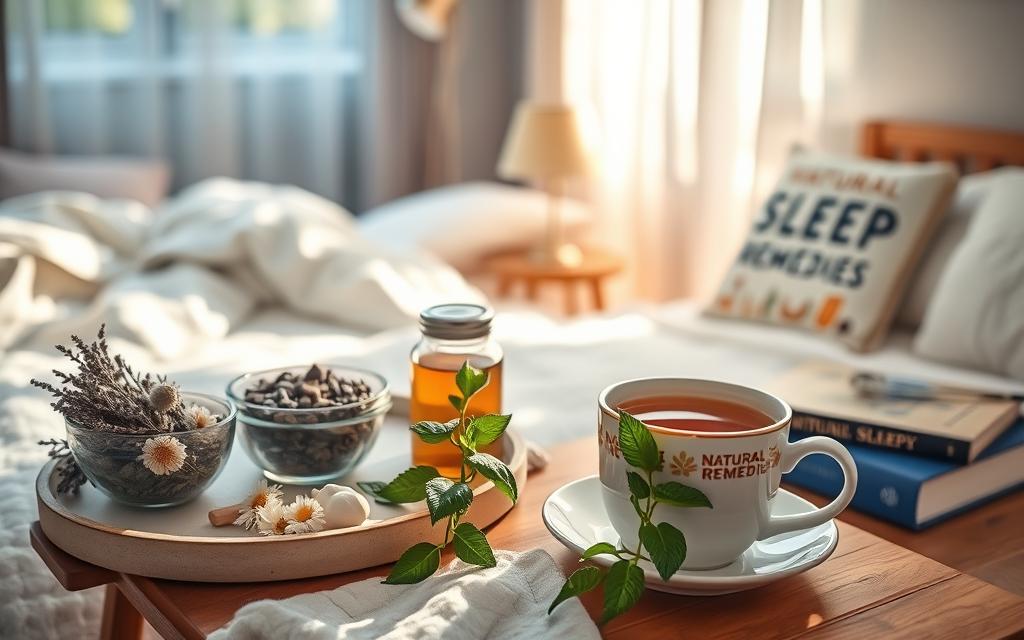
Practical Tips to Incorporate Sleep-Inducing Foods
To add sleep-friendly foods to your diet, you need to plan well. Focus on making food choices that help you sleep better. Foods rich in magnesium, tryptophan, and vitamin B6 are great for this.
Creating a Sleep-Friendly Meal Plan
Creating a meal plan for better sleep means picking foods that relax you. Foods like bananas and almonds are full of magnesium. They help relax muscles and improve sleep. Eating these foods regularly can help you sleep better, which is important for those with sleep problems.
At least 10% of adults have chronic insomnia, and what they eat can help19.
Combining Foods for Maximum Effectiveness
Food combinations are key in sleep meal planning. Mixing complex carbs with proteins high in tryptophan boosts tryptophan use. A banana and yogurt snack before bed is a good example. It combines magnesium and tryptophan for relaxation and muscle recovery20.
It’s important to avoid big meals or spicy foods before bed. They can cause discomfort and mess with your sleep.
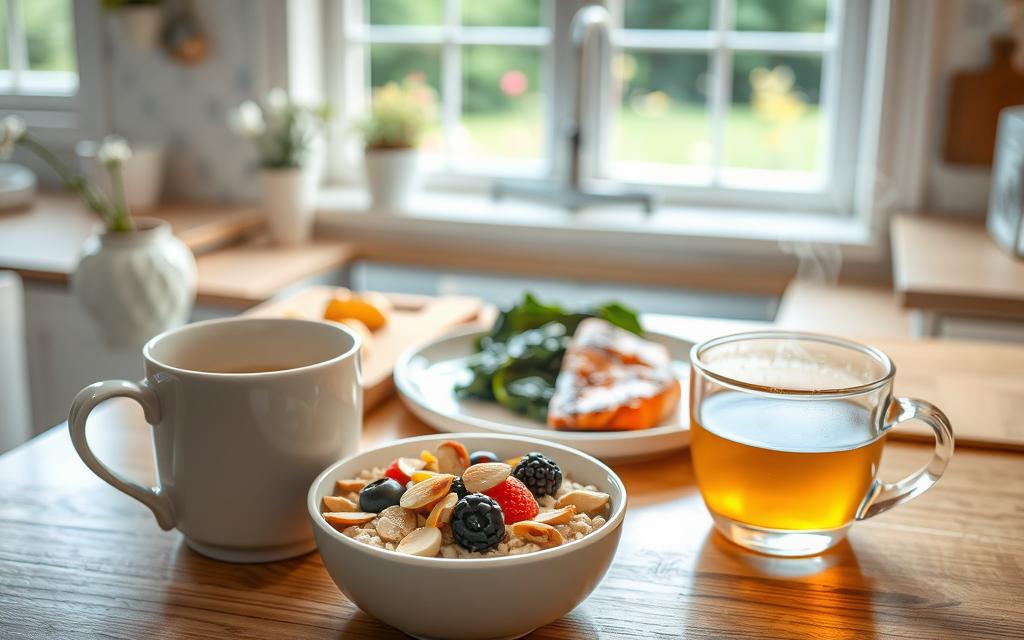
Conclusion
Diet is key in fighting insomnia and anxiety. Eating foods that help sleep can improve your rest. Avoiding caffeine and sugar is also important.
Adding foods rich in magnesium and tryptophan can boost sleep quality. This can lead to better health overall.
Studies show that short sleepers eat less varied diets. They also feel hungrier, leading to more calories21. Diets like the Mediterranean and DASH can help sleep better22.
So, it’s crucial to plan meals and snacks with sleep in mind. This helps in achieving better sleep through diet.
Starting with the right foods can lead to better sleep. Our diet greatly affects our sleep and overall health.
FAQ
What are some natural remedies for sleep that can help with insomnia?
Herbal teas like chamomile and valerian root can help you relax. A calming bedtime routine also helps improve sleep quality.
Which foods for insomnia should I include in my bedtime snacks?
Try low-fat yogurt with fruits or whole grain crackers with nut butter. They offer nutrients like tryptophan and magnesium for better sleep.
How does diet influence insomnia and anxiety?
What you eat affects your mood and sleep. Foods that boost serotonin and melatonin can help fight insomnia and anxiety.
What are the best foods for insomnia?
Kiwi, fatty fish like salmon, and nuts like walnuts and almonds are great. They’re full of nutrients that help you sleep better.
What role does magnesium play in improving sleep?
Magnesium relaxes muscles and calms the mind, making it easier to sleep. Eating foods rich in magnesium can help with insomnia.
Why is the timing of meals important for sleep quality?
Eating dinner four hours before bed lets your body digest. This prevents discomfort or acid reflux during sleep.
Which foods should be avoided to enhance sleep quality?
Avoid foods with caffeine and high sugar, like those eaten in the evening. They can make it hard to fall asleep.
Can I combine foods to create an effective bedtime snack for insomnia?
Yes, mixing complex carbs with tryptophan-rich proteins, like bananas with yogurt, can help you sleep better.
How do serotonin and melatonin influence sleep?
Serotonin helps regulate mood and sleep, while melatonin tells your body it’s time to sleep. Foods that increase these hormones can improve sleep.
What are some insomnia-fighting foods I can incorporate into my diet?
Tart cherries are high in melatonin, and fatty fish have omega-3s. Both can help fight insomnia and improve sleep.
Source Links
- What should I eat for a good night’s sleep? – https://www.bbc.co.uk/food/articles/eat_for_good_sleep
- Foods That Cause Insomnia: 10 Foods to Avoid – https://www.verywellhealth.com/foods-that-cause-insomnia-5219097
- Nutrition and Sleep: Diet’s Effect on Sleep – https://www.sleepfoundation.org/nutrition
- The Link Between Nutrition and Sleep – National Sleep Foundation – https://www.thensf.org/the-link-between-nutrition-and-sleep/
- Effects of Diet on Sleep Quality – https://pmc.ncbi.nlm.nih.gov/articles/PMC5015038/
- Insomnia and your diet – https://sleepeducation.org/insomnia-your-diet/
- Find out how food and anxiety are linked – https://www.mayoclinic.org/diseases-conditions/generalized-anxiety-disorder/expert-answers/coping-with-anxiety/faq-20057987
- Can’t Sleep? Check What’s on Your Plate – https://health.clevelandclinic.org/foods-that-help-you-sleep
- The Best Foods To Help You Sleep – https://www.sleepfoundation.org/nutrition/food-and-drink-promote-good-nights-sleep
- Top Ten Foods to Avoid for a Good Night’s Sleep – https://comprehensivesleepcare.com/2023/10/18/top-ten-foods-to-avoid-for-a-good-nights-sleep/
- The Best and Worst Foods for Better Sleep, According to a Doctor – https://www.eatingwell.com/article/8036808/the-best-and-worst-foods-for-better-sleep-according-to-a-doctor/
- Healthy Bedtime Snacks To Eat Before Sleep – https://www.sleepfoundation.org/nutrition/healthy-bedtime-snacks
- Try These 15 Pre-Bedtime Snacks for Deeper, Sounder Sleep – https://www.healthline.com/health/sleep/bedtime-snacks-to-help-you-sleep-through-the-night
- Get Healthy Sleep by Eating Right on Schedule – National Sleep Foundation – https://www.thensf.org/get-healthy-sleep-by-eating-right-on-schedule/
- Meal Timing and Sleeping Energy Metabolism – https://pmc.ncbi.nlm.nih.gov/articles/PMC9919906/
- Doze Control: Eat Right and You’ll Sleep Like a Baby – https://www.webmd.com/sleep-disorders/features/doze-control-eat-right-youll-sleep-like-baby
- Home remedies for insomnia: 9 options – https://www.medicalnewstoday.com/articles/home-remedies-for-insomnia
- Natural Sleep Aids: Home Remedies to Help You Sleep – https://www.hopkinsmedicine.org/health/wellness-and-prevention/natural-sleep-aids-home-remedies-to-help-you-sleep
- 15 Proven Tips to Sleep Better at Night – https://www.healthline.com/nutrition/17-tips-to-sleep-better
- Foods that help you sleep – The Sleep Charity – https://thesleepcharity.org.uk/information-support/adults/sleep-hub/foods-that-help-you-sleep/
- Nutritional Elements in Sleep – PMC – https://pmc.ncbi.nlm.nih.gov/articles/PMC9859770/
- Influence of nutrition and food on sleep—is there evidence? – Sleep and Breathing – https://link.springer.com/article/10.1007/s11325-023-02921-1
